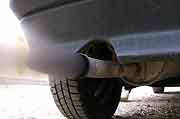- Are You Making This Expensive Thermostat Error This Winter?
- Recognizing the Signs of Hypothyroidism
- 10 Strategies to Overcome Insomnia
- Could Artificial Sweeteners Be Aging the Brain Faster?
- Techniques for Soothing Your Nervous System
- Does the Water in Your House Smell Funny? Here’s Why
- Can a Daily Dose of Apple Cider Vinegar Actually Aid Weight Loss?
- 6 Health Beverages That Can Actually Spike Your Blood Sugar
- Treatment Options for Social Anxiety Disorder
- Understanding the Connection Between Anxiety and Depression
EPA Sets Tougher Auto Fuel, Emissions Standards


The U.S. Environmental Protection Agency on Monday announced new fuel and emissions standards that should significantly lower the levels of pollutants that cars and trucks spew into the air, the agency said.
By slashing the amount of harmful air pollution, the new rules should also help prevent premature deaths and respiratory illnesses, the agency said in a news release. By 2030, total health-related benefits will be between $6.7 billion and $19 billion annually, EPA officials noted.
“These standards are a win for public health, a win for our environment and a win for our pocketbooks,” EPA administrator Gina McCarthy said in an agency news release. “By working with the auto industry, health groups and other stakeholders, we’re continuing to build on the Obama administration’s broader clean fuels and vehicles efforts that cut carbon pollution, clean the air we breathe and save families money at the pump.”
The regulations will lower the amount of smog-forming compounds and nitrogen oxides by 80 percent, establish a 70 percent tighter particulate matter standard, and virtually eliminate fuel vapor emissions, the agency explained.
Gasoline sulfur levels should drop by more than 60 percent under the new fuel standards, the agency added. Reducing sulfur in gasoline allows vehicle emission control technologies to perform more efficiently, the experts noted.
Under the new rules, oil refiners will have to install new equipment to remove sulfur from gasoline and car makers will be required to use new, cleaner-burning engine technology. The changes for car and truck makers will take effect in the model year 2017, while refineries will have up to six years to meet the new standards, according to the EPA.
The new rule will also lead to higher prices for gas and cars. The new sulfur standards will cost roughly a penny per gallon of gasoline once the standards are fully in place. The new vehicle emission standards will increase the cost of a vehicle by roughly $72 by 2025, the EPA said.
However, the new standards will prevent as many as 2,000 premature deaths, 19,000 asthma attacks, 2,200 hospital admissions and asthma-related emergency room visits, 50,000 cases of respiratory symptoms in youngsters, and 1.4 million missed school and work days annually, according to the EPA.
More information
Visit the U.S. National Library of Medicine for more on the health effects of air pollution.
Source: HealthDay
Copyright © 2026 HealthDay. All rights reserved.










